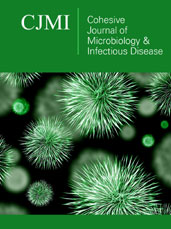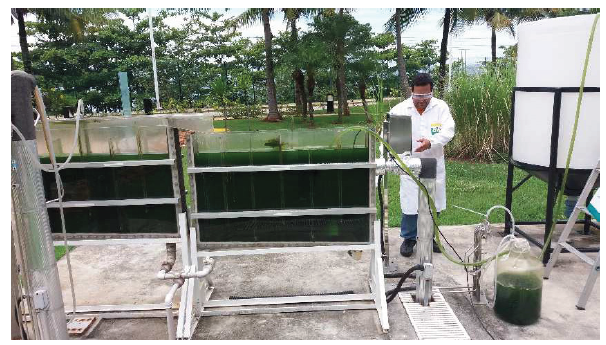- Submissions

Full Text
Cohesive Journal of Microbiology & Infectious Disease
Biotechnology and Its Simultaneous Evolution
Leonardo Brantes Bacellar Mendes1*, Carolina Vieira Viegas2, Rafael Richard João3 and Ronaldo Bernardo da Silva4
1Research and Development Center Leopoldo Miguez de Mello–Petrobras, Brazil
2Federal University of Rio de Janeiro - Chemistry School, Brazil
3Research and Development Center Leopoldo Miguez de Mello-Petrobras, Brazil
*Corresponding author: Leonardo Brantes Bacellar Mendes, Research and Development Center Leopoldo Miguez de Mello–Petrobras, Brazil
Submission: November 22, 2019; Published: December 04, 2019

ISSN 2578-0190 Volume3 issues2
Mini Review
Biotechnology is currently developing across borders rapidly and simultaneously. New equipment is continuously developed and refined to improve production processes and quality control associated with obtaining the most diverse bioproducts such as biosurfactants, natural dyes, antioxidants and antibiotics. There is no industrial biotechnological process that works generically and each requires particular solutions that can sustain a good scale up from scientific and technological points of view.
State-of-the-art centrifuges and decanters "taylor made" with high commercial value have a prominent place in unit operations for the separation of micro-organisms of interest or the culture medium containing bioproducts or only for clarification of the final product as in the industrial procurement of wine.
High-sensitivity flow cytometers with cellular recognition capability utilizing information on biochemical composition, shape and size help in screening and sorting out new strains of microorganisms to be grown for the discovery of promising new molecules (e.g. antivirals to fight HIV).
On the other hand, the huge variety of new newly synthesized reagents – molecular probes – has been assisting in the detection and quantification of target molecules "in situ", an extremely important fact for rapid evaluation and intervention throughout bioprocesses with short production cycles.
The company Life Technologies Corporation (Figure 1), recently acquired by Thermo Fisher Scientific, has available in its catalog of molecular probes 35 reference standards for flow cytometry at the disposal of the international scientific community, in addition to other catalogs containing hundreds of other equipment, kits and reagents.
Figure 1: Electroporator manufactured by Life Technologies used internally in San Diego/USA (author’s personal archive).

However, the advances made by new equipment and methodologies applied to unit operations can at any time be radically modified by interventions that may change the constitution and expression of the genetic code present in target microorganisms.
The programmed decrease in robustness and mechanical strength of plant cell walls, for example, considerably decreases the energy required - whether thermal or mechanical-for their disruption, facilitating the extraction of target compounds with significantly lower investment and operating costs when designing a future business venture.
The heat resistance of some microorganisms provided by the biosynthesis of heat shock resistant proteins (chaperones) in turn can radically alter the need to cool closed systems whose crops are typically crashed at temperatures above 35 ᵒC (Figure 2). The absence of coolers for biotechnological processes means a considerable competitive advantage by saving the purchase of this equipment, maintenance and also the energy consumption caused by its use.
Figure 2: Closed system to obtain micro-algal biomass running at Petrobras R&D Center.

Beyond the examples given above there are many other possibilities from the modification and edition of the genetic code with potential to promote major changes in the configuration of future processes or that are already being used to manufacture several categories of bioproducts, including the latest generation biofuels.
A partnership between Exxon Mobil and Synthetic Genomics recently yielded encouraging results published in the Journal Nature Biotechnology in 2017 on achieving high yield in genetically modified Nannochloropsis gaditana crops that successfully achieved high lipid concentration (40% in ash free dry weight).
Other undisclosed advances are certainly underway and could at any time improve or even replace existing commercial bioprocesses and bioproducts (e.g. replacement of vaccines and antidotes produced with the use of animals by those produced using plants).
© 2019 Leonardo Brantes Bacellar Mendes. This is an open access article distributed under the terms of the Creative Commons Attribution License , which permits unrestricted use, distribution, and build upon your work non-commercially.
 a Creative Commons Attribution 4.0 International License. Based on a work at www.crimsonpublishers.com.
Best viewed in
a Creative Commons Attribution 4.0 International License. Based on a work at www.crimsonpublishers.com.
Best viewed in 







.jpg)






























 Editorial Board Registrations
Editorial Board Registrations Submit your Article
Submit your Article Refer a Friend
Refer a Friend Advertise With Us
Advertise With Us
.jpg)






.jpg)














.bmp)
.jpg)
.png)
.jpg)










.jpg)






.png)

.png)



.png)






